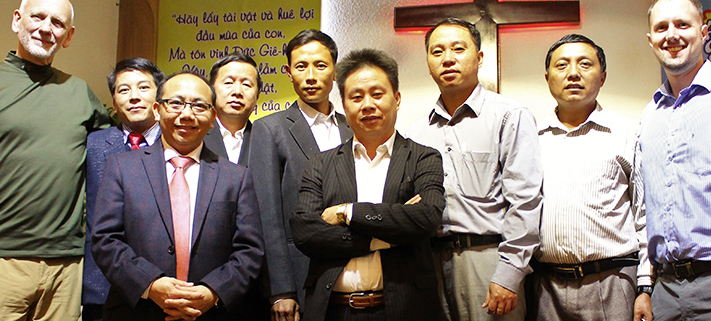Confessions of faith: Nielsen
When attending a worship service with a high school girlfriend, Carter Nielsen was challenged to have a more active relationship with Christ.
Dayton Hamann
Carter Nielsen adores the mountains. As an environmental consultant in Buffalo, Wyoming, Nielsen shows oil companies, gas companies, and other natural resource businesses how to interact with the land safely. When out working in those peaks and valleys, he keeps his heavenly Father at the front of his mind.
“Sometimes, I’d rather be in the mountains thinking about God than in church thinking about the mountains,” Nielsen says, chuckling.
Currently a member at Living Shepherd, Laramie, Wyo., Nielsen and his fiancé are leading a project to establish a secondary site for Living Shepherd in Buffalo.
Nielsen’s commitment to Christ stems from the lessons of his childhood and the events of his senior year in high school.
The bigger picture
Nielsen estimates he attended worship four times before he turned 18. He usually made these visits with friends, though his parents occasionally attended church for major holiday services. He was neither appalled nor captivated by the ideas of church and faith.
“It was something to do,” he recalls. “It was never pushed on me during those times. I didn’t think about it too much.”
Nielsen’s mother wasn’t raised religiously, but his father—a hunting guide—was. Though they attended church infrequently, Nielsen’s father planted and nurtured the idea that the world was a created place worth revering.
“As a hunting guide, my father instilled in me a deep sense of respect and understanding for ‘God’s country’ and all living things in it,” Nielsen says. Though his knowledge of God’s Word was limited, Nielsen began to see his heavenly Father’s fingerprints in the fields, forests, and mountains that he loved so much.
He explains his childhood and first years of faith by saying, “I always knew God was up there, but I didn’t yet know what he had done for me. It is surprising how much I missed.”
New relationships
During his senior year of high school, Nielsen was invited by his then-girlfriend’s family to the Easter Sunday church service. Nielsen acknowledges that he had some hesitations. “I was selfish. I like Sundays to myself. I was a bit scared I wouldn’t have time to go to the mountains anymore or otherwise enjoy my weekends.”
But, having no qualms with the church beyond his potential scheduling conflicts, he ultimately agreed to attend. Recalling the worship service, Nielsen pinpoints a moment of intense clarity: “The pastor bluntly said, ‘If you only attend church on Easter Sunday and Christmas, you may have to examine your faith.’ ”
Though Nielsen’s relationship with this girl eventually came to a close, the Holy Spirit had inspired him to give more focused and more intentional thought to his relationship with Christ. That same year, Nielsen’s parents divorced. Though he was understandably distressed, his newfound belief supported him. He recalls feeling empowered, more confident he would persevere this change in his family.
This faith-forged courage stayed with him as he began college at the University of Wyoming in Laramie in 2012. A few weeks into his first semester, the mother of Nielsen’s former girlfriend mentioned to him that they knew a pastor in Laramie: Pete Zaferos of Living Shepherd. During that same week, Nielsen was eating lunch with his neighbor from the college dormitory. This classmate also knew Zaferos. He told Nielsen that Zaferos had asked about him. God was giving Nielsen a clear opportunity.
“I went to Living Shepherd that weekend,” Nielsen explains. “And from there, I was hooked. Pastor and all the welcoming members made me feel part of the group.” As a younger minister, Zaferos’ sensibilities resonated with Nielsen. They formed a friendship, occasionally hunting and ice fishing together.
Nielsen attended Living Shepherd regularly throughout the rest of 2012 and 2013. After completing basic Bible instruction courses, he was confirmed into the church on Dec. 8, 2013.
Around this time, Nielsen also reconnected with a girl named Emily. They had been acquaintances for a few years, running into one another at statewide FFA events during high school and then at the Wyoming State Fair in 2009. There, they had bonded over Nielsen’s show pig.
“My pig would always lay down and roll over if you scratched her belly,” Nielsen explains. “Emily—being the animal lover that she is—did just that, and then proceeded to lay with her in the grass and talk to me. I had always had a crush on Emily, and I knew from that moment she would be important to me.”
After the fair they had lost touch, but they reconnected again over social media and began to see one another. Soon, they also began to attend church together.
Building a family of believers
Nielsen and Emily are now engaged. Though it is about a four-hour trip from Buffalo, where they currently reside, they still attend Living Shepherd in Laramie as often as possible.
Still, because of this long drive to Laramie, Nielsen and Emily are developing an alternative. With the help of Zaferos, they are starting a new site for Living Shepherd. This site will join two other locations—one in Scottsbluff, Nebraska, and one in Rock Springs, Wyoming. All sites are connected, with Zaferos coming in person for some worship services or serving via worship streamed live online.
Nielsen and Emily first watched the livestream of the Living Shepherd service at his home on Sundays. A friend or two would join them occasionally, but they began to think bigger.
Emily’s brother owns a small brewery in Buffalo with a large pub space perfectly suited for group gatherings. Nielsen and Emily plan to set out chairs and watch the worship service on a large screen via a projector there. Nielsen says they also hope to add a speaker system and then advertise their worship schedule across the city.
Nielsen hopes to draw in local young people like him and his fiancé. “If we can get even five more people to join us, that would be fantastic. We need the people, and the rest will come from there,” Nielsen says.
“A change for the better”
Nielsen notes how his perception of other believers has changed over the years: “When I was a kid, I thought they were a whole different tier of person. I didn’t understand what it meant to be Christian. Now I see that Christians are humble and they want to help you. I hope I am turning into a person like that.”
Those who have seen Nielsen’s devotion to spreading God’s Word would assure him of that hope, but he remains modest, saying, “After 18 years, I just made a change for the better.”
Dayton Hamann, a staff writer for Forward in Christ magazine, is a member at St. Matthew, Marathon, Wisconsin.
To stay up-to-date on the progress of Living Shepherd’s new sites—including the one in Buffalo—and to watch its livestreamed worship services, visit livingshepherd.com.
SUBMIT YOUR STORY
Do you have a manuscript, idea, or story from your own life you’d like to share for use in Forward in Christ or on wels.net? Use our online form to share it to our editorial office for consideration.
SUBSCRIBE TO FORWARD IN CHRIST
Get inspirational stories, spiritual help, and synod news from Forward in Christ every month. Print and digital subscriptions are available from Northwestern Publishing House.
Author: Dayton Hamann
Volume 105, Number 9
Issue: September 2018
Copyrighted by WELS Forward in Christ © 2021
Forward in Christ grants permission for any original article (not a reprint) to be printed for use in a WELS church, school, or organization, provided that it is distributed free and indicate Forward in Christ as the source. Images may not be reproduced except in the context of its article. Contact us




